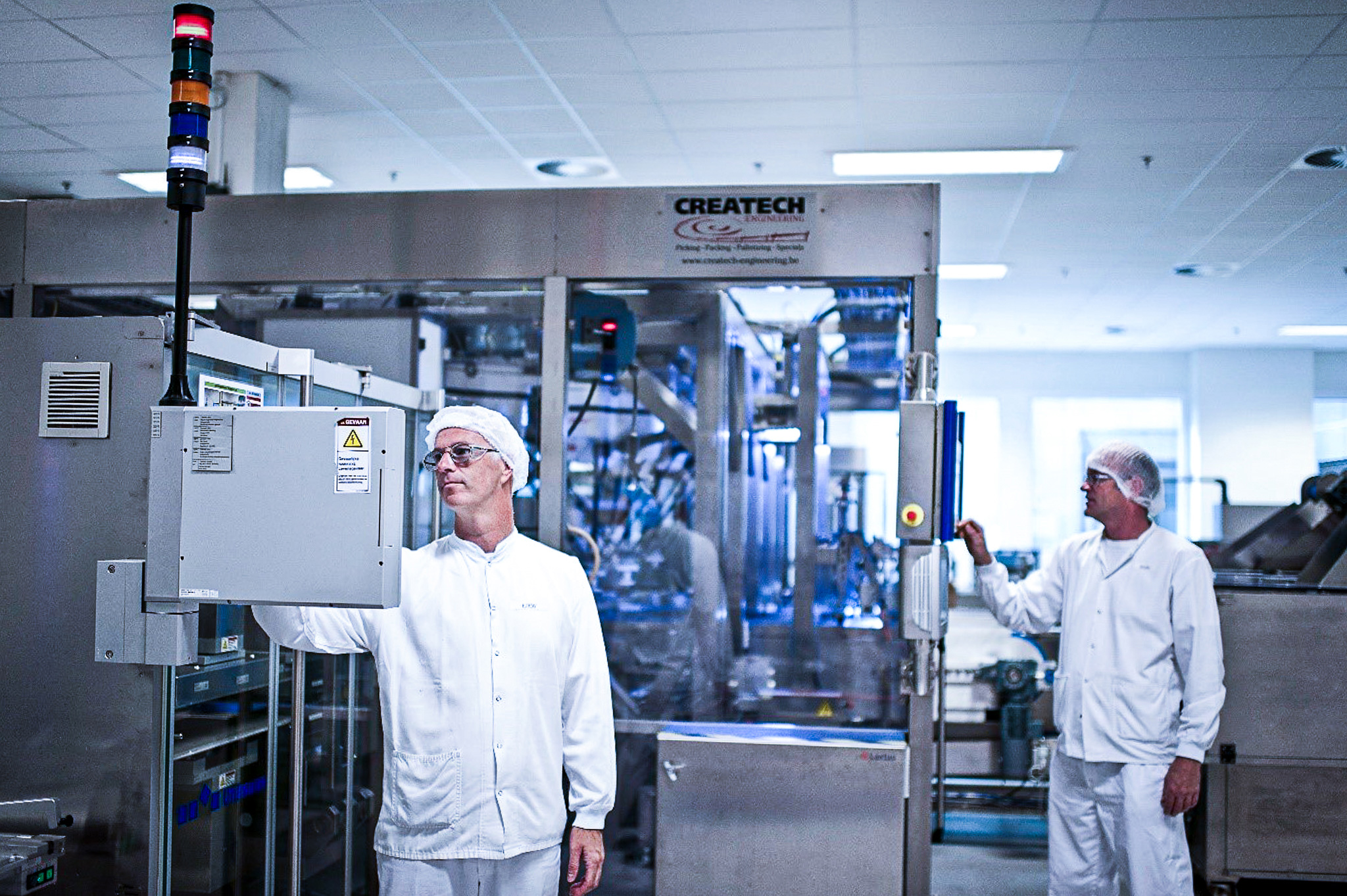Smart and flexible manufacturing for a healthy future in the pharmaceutical industry

Smart and flexible manufacturing for a healthy future in the pharmaceutical industry
Janssen Pharmaceutica, Pfizer, Sanofi, Agilent, EG, Novartis, MSD, Amgen,... .
Flanders has one of the highest concentrations of top biotech and pharmaceutical companies in the world and a multitude of solution-oriented automation companies with a strong focus on the manufacturing industry and the Life Sciences market.
Pharmaceutical companies are strongly committed to digitisation. Technological innovation allows them to improve and accelerate the development and production of their medicines. In this way, they can contribute to optimising the quality of care for patients.
At the same time, these companies are facing increasing operational challenges in terms of production flexibility, time-to-market, digital competences of employees, safety and quality standards. They are also under pressure to increasingly reduce operational costs and waste, and this in a context where production is scattered across the world and the value chain is often very complex, with multiple partners and suppliers.
This makes it difficult for companies to realise the much needed digital transformation on their own. For them, working together with others is the key to success in introducing digital technologies and making structures and processes more efficient and effective. The value of sharing knowledge and of creative and refreshing ideas that arise from cross-fertilisation cannot be underestimated.
More and more companies from various sectors, including the pharmaceutical industry, are calling on Flanders Make's applied knowledge and high-tech testing and validation infrastructure to introduce new proof-of-concepts on the shop floor and in lab environments. Flanders Make offers different ways, tailored to each individual company, to carry out research and development.
Successful proof-of-concept demonstrations and realisations at Janssen Pharmaceutica, Sanofi and Pfizer
JANSSEN PHARMACEUTICA in Beerse recently conducted a feasibility study for a new cobot (collaborative robot) application in cooperation with Flanders Make. The company intends to use this cobot application to take over repetitive tasks from a lab technician in a flexible manner, allowing the lab technician to focus on more interesting tasks generating higher added value. The main drivers for using a cobot in laboratory environments are safety and flexibility in material handling. For the realisation of the proof-of-concept, Flanders Make took into account the way in which samples are delivered, the required manipulations, geometrical restrictions and the strict safety and hygiene standards. The cobot has been equipped with technology facilitating its programming and configuration. It also has a customised gripper design and a camera-based feed system to automatically locate objects.
In addition, Janssen Pharmaceutica is working with Flanders Make and various partners in a collaborative research project on an economically feasible and user-friendly Augmented Reality (AR) application. Solutions are being developed to support operators with digital instructions that they can use hands-free for the right task at the right time. A specific use case is making the conversion and set-up of the production line for syrups more efficient. The use of digital instructions facilitates the training of operators and increases their flexibility, reduces the risk of errors and shortens the necessary set-up and changeover times, thus increasing overall productivity. This is becoming increasingly important given the trend towards higher variability, lower volumes and increasing product requirements as well as the technical complexity of production lines. In an earlier interview, Isabel Vanlinthout, Senior Manager Supply Chain Strategy and Support at Janssen Pharmaceutica, stated that the group in Beerse is able to confirm its position as a leading site in terms of production automation and innovation within the global Johnson & Johnson network, and is even reinforcing this status by implementing new technological solutions.

Pfizer
PFIZER in Puurs wants to automate parts of the packaging phase of the assembly line to increase efficiency and free up operators for other important tasks in the plant. Here as well, an approach was chosen in which Flanders Make realises a Proof-of-Concept of a flexible work cell with a cobot that can then be produced and maintained by technology providers and integrators. The use of collaborative robotics combining technological advantages such as repeatability and accuracy with the strengths of operators such as flexibility and creativity offers many benefits and ensures that physical or mental strain among employees is avoided as much as possible.
Sanofi
SANOFI in Geel also continuously invests in innovative digital technologies and uses artificial intelligence to launch the next generation of personalised therapeutic solutions for chronic diseases. One of Sanofi's digital production facilities in the United States recently received the Facility of the Year Award from the International Society for Pharmaceutical Engineering. In Flanders, too, Sanofi has the ambition to extensively digitise the production steps and make them paperless. The digital transformation at Sanofi in Geel must support the overall performance of the organisation by systematically removing digital waste from the operational processes, structurally adapting the culture, organisation and infrastructure to the digital future and intensifying the digital experience of its employees. Bram Hannes, Manufacturing Manager at Sanofi, explains that digitising is more than upgrading infrastructure, developing tools and deploying hardware: "Every day, we have to redesign the way in which we think, plan and work. We must transform along with IT!"

Sanofi established contact with Flanders Make. Initially, we demonstrated with the mobile MAKE LAB for 3 days to more than 150 Sanofi employees how working conditions will be in the production environment of the future. Among other things, we introduced employees to digital work instructions, Virtual and Augmented Reality, 3D projections and programming and working with cobots.
Industry 4.0 in the pharmaceutical sector
Industry 4.0 offers both opportunities and challenges for the pharmaceutical industry. By making use of emerging technologies such as artificial intelligence, Industrial Internet of Things, smart sensors and digital twins, companies in the pharmaceutical industry can also effectively evolve towards this new smart and flexible production environment and can look forward to a healthy future in Flanders.
To optimally prepare our companies in Flanders for all these changes, we’ve worked out a roadmap, enabling them to start making their products and production future-proof. Applying the above-mentioned disruptive technologies is of fundamental importance for this.
